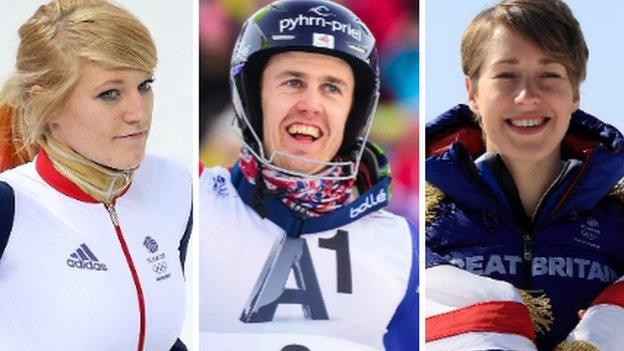Winter Olympics: Pyeongchang cold, Team GB, Russia and a united Korea
- Published
XXIII Olympic Winter Games |
|---|
Venue: Pyeongchang, South Korea Dates: 9-25 February |
Coverage: Watch live on BBC TV, Red Button, Connected TVs, BBC Sport website and mobile app. Full coverage times |
The 23rd Winter Olympics begin in Pyeongchang on Friday and are set to be the coldest in history.
The build-up has seen relations thaw between North and South Korea, with the countries fielding a joint women's ice hockey team, while there has been controversy over the 169 Russian athletes set to compete as neutrals.
Team GB sent a record 59 athletes to South Korea - three more than at Sochi 2014 - and are aiming for their most successful Winter Games, with a medal target of five or more.
However, on the eve of the Games, one of the medal prospects, snowboarder Katie Ormerod, was ruled out after suffering a broken heel and wrist after crashing twice in slopestyle practice.
Over 17 days, more than 3,000 of the world's best athletes will compete in 102 medal events in 15 sports.
Around 77% of tickets have been sold - approximately 826,000 - across the 13 venues in South Korea.
You can follow all the action across BBC TV, radio and digital channels, as well as the BBC Sport website, where live streams and on-demand clips can be viewed on desktop, tablet and mobile.
The coldest Games in history?
Temperatures set to drop in Pyeongchang
Heat pads, blankets, a warm seat cushion and raincoats are on offer for spectators as they prepare to watch extreme sport in extreme weather in Pyeongchang, where temperatures dip below zero for a third of the year.
The Games are held around two main venues - Alpensia, the mountain resort, and Gangneung on the coast, with stand-alone venues in Bokwang and Jeongseon.
While residents of Gangneung are treated to relatively warm temperatures - ranging between 6C and -2C - the wind chill in the mountainous regions means it can feel as cold as -25C.
That would see the Games surpass the 1994 edition in Lillehammer, Norway, where temperatures dipped to -11C.
The 35,000-seater purpose-built Olympic Stadium, situated north east of Alpensia, has been built without a roof and temperatures for Friday's opening ceremony - which starts at 20:00 local time (11:00 GMT) - are forecast to drop to -5C.
It will certainly differ from Sochi four years ago, when temperatures as high as 20C saw the Games go down as the warmest on record.
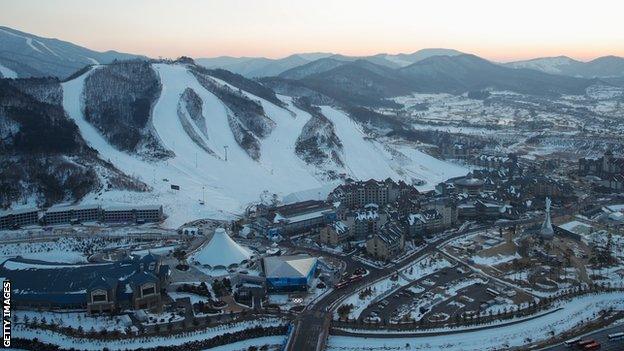
Alpensia is the focus for the outdoor events at the Winter Games in Pyeongchang
But there is good news for those attending Friday's curtain-raiser, with temperatures expected to be "not problematic to having the opening ceremony", according to Korean Meteorological Administration deputy director Choi Heung-jin.
The cold has not been the only problem in the build-up, as 86 cases of norovirus have been confirmed among security staff, leading to soldiers having to replace them as guards.
Who are Team GB's medal hopes?
Four years ago, Britain's Lizzy Yarnold won skeleton gold in Sochi, the curling team won silver and bronze and Jenny Jones secured snowboard bronze, the first British medal on snow.
That was their joint best medal total alongside 1924, but Team GB will be looking to make Pyeongchang a record-breaking Games.
These are Britain's top prospects:
Winter Olympics 2018: Elise Christie - from zero to hero in South Korea
Alpine skiing: In January 2017, Lancashire's Dave Ryding, 31, equalled Britain's best World Cup finish, picking up slalom silver in Kitzbuhel. He will aim for his first Olympic medal at the third attempt.
Bobsleigh: The men's four came fifth in Sochi but have since been upgraded to bronze after two Russian teams were disqualified following the country's doping scandal. The two four-man teams in Pyeongchang have both picked up World Cup medals in the run-up to the Games.
Cross country skiing: Scotland's Andrew Musgrave, 27, is currently ranked 18th in the world. He comes into his third Games having won World Cup 15km freestyle bronze in December and finished fourth in the 50km freestyle at the 2017 World Championships.
Curling: The women's rink, skippered by 27-year-old Eve Muirhead, are the reigning European champions and won bronze in Sochi. The men's rink won silver four years ago but the team has been overhauled for Pyeongchang. The new-look side, led by 25-year-old Kyle Smith, took European silver in November.
Freestyle skiing: In slopestyle, Team GB have James Woods, Izzy Atkin and Katie Summerhayes in their ranks. Summerhayes, 22, won World Cup silver in November, while both United States-born Atkin, 19, and James Woods, 26, won X Games medals in January.
Short track: After suffering three disqualifications in Sochi, Scotland's Elise Christie, 27, goes into her third Olympics having won 1,000m, 1500m and overall gold at the World Championships in Rotterdam in 2017.
Skeleton: Kent's Lizzy Yarnold, 29, won Britain's only gold of the Sochi Olympics. Although she has struggled for form this season, she did claim bronze in the World Cup at Lake Placid.
Snowboarding: X Games big air bronze medallist Billy Morgan, 28, finished seventh in Sochi and hopes to be in contention for a medal this time.
Korea unites
Following the first high-level political talks in two years, North Korea have sent 22 athletes in five sports across the border to Pyeongchang after agreeing a breakthrough deal.
The two nations will march together at the opening ceremony under a united flag and will field a joint women's ice hockey team - a move that has proved unpopular with some in the south, who believe the late inclusion of North Korean players will jeopardise their chances of a medal.
The team played together for the first time on Sunday in their only practice match, which they lost 3-1 to Sweden.
As well as skiers and figure skaters, the North are also sending hundreds of delegates, cheerleaders and performers.
There were small protests against the unified team, while hundreds of South Koreans demonstrated on Tuesday as a ship from North Korea carrying around 120 performers arrived at the eastern port of Mukho.
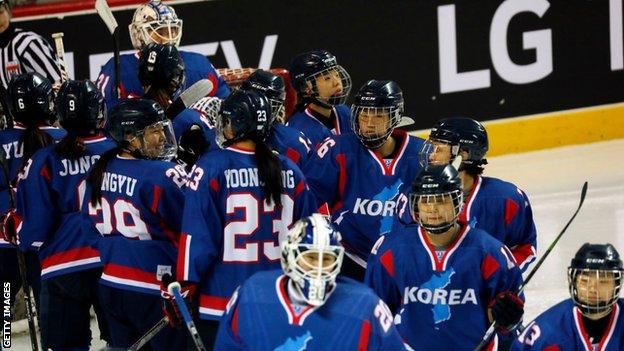
The joint Korean ice hockey team
Russians become neutrals
Russia topped the medal table at their home Games in Sochi, but the country was banned from competing in Pyeongchang by the International Olympic Committee (IOC) following an investigation into state-sponsored doping.
The IOC has invited 169 Russians who have met the anti-doping criteria to compete as independent athletes. A further 47 athletes and coaches appealed against their exclusion from the Games, including the 28 athletes who had their life bans lifted by the Court of Arbitration for Sport (Cas) last week.
But Cas dismissed their appeals on Friday, eight hours before the opening ceremony.
The Russians who are competing as neutrals will do so under the IOC flag, having been warned not to replicate their country's tricolour flag using their kit.
A game of firsts
'We're all goofballs' - meet the first African bobsleigh team at a Winter Olympics
Skiers Lindsey Vonn, Mikaela Shiffrin and snowboarder Shaun White will be some of the stars on display in Korea.
But the Games are not purely about the medal contenders from the traditional giants, and there will be plenty of firsts.
Akwasi Frimpong has swapped the track for the ice as he becomes Ghana's first Olympic skeleton athlete and the first black skeleton athlete in the Winter Olympics.
Jamaica will have its first women's bobsleigh team lining up in Pyeongchang, while Seun Adigun, Ngozi Onwumere, and Akuoma Omeoga will represent Nigeria in the same discipline.
The Nigeria trio are their country's first Winter Olympians, and the first African sled to compete at the Winter Olympics.
Tonga's Pita Taufatofua, who carried his country's flag at the Rio Olympics in 2016, has swapped taekwondo for cross-country skiing.
- Published22 February 2018
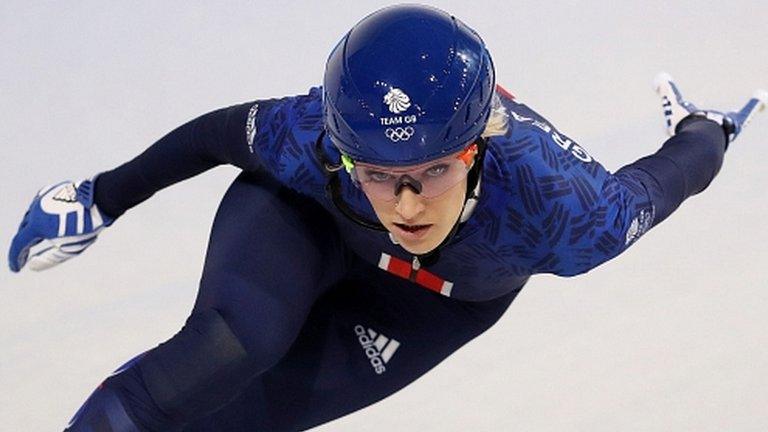
- Published24 February 2018
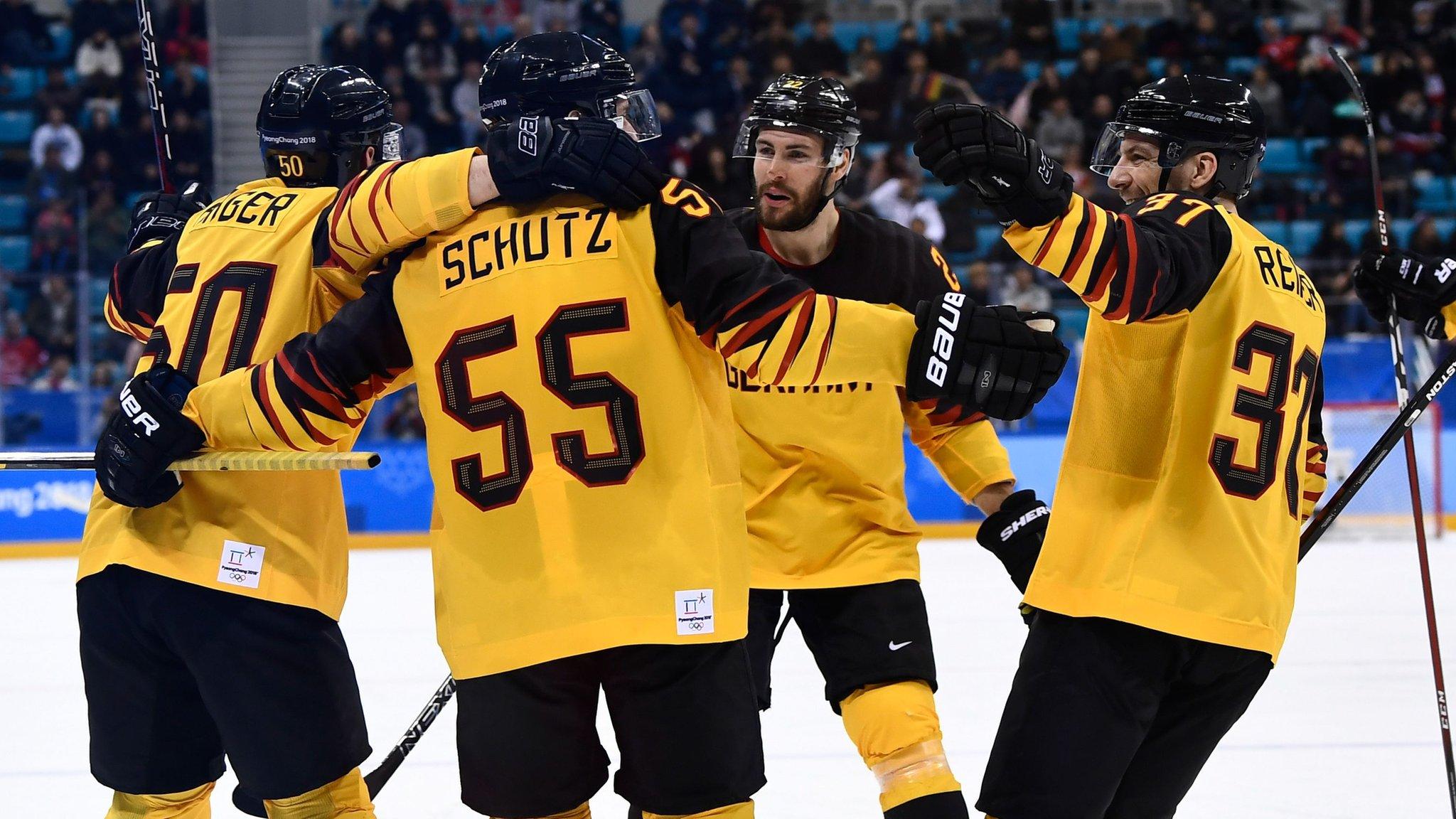
- Published8 February 2018
